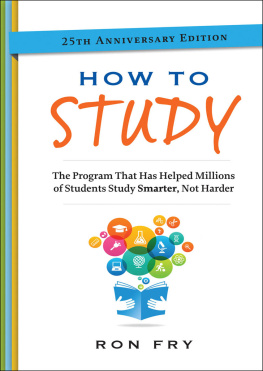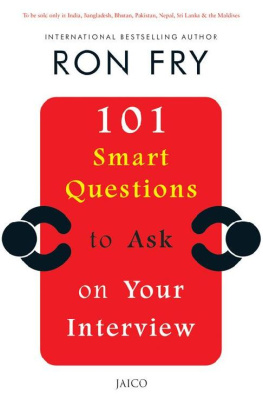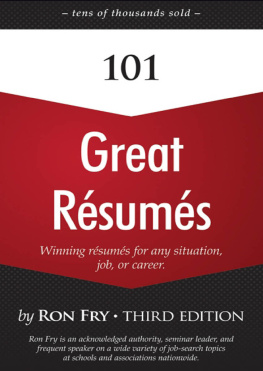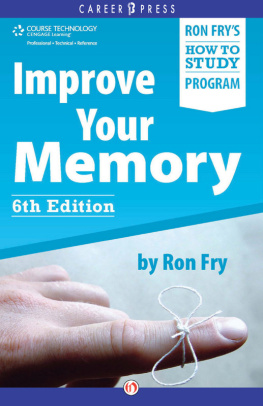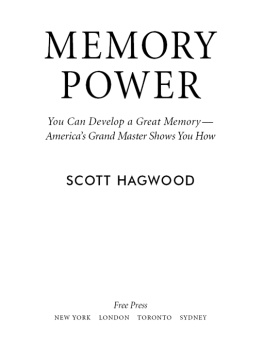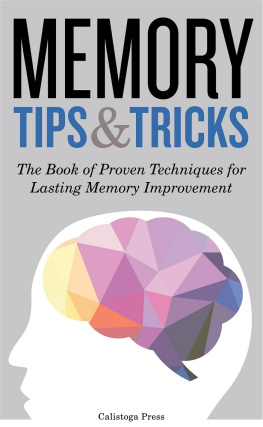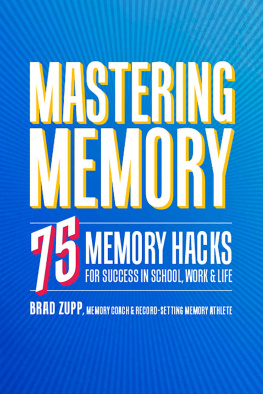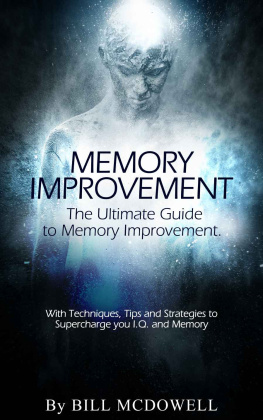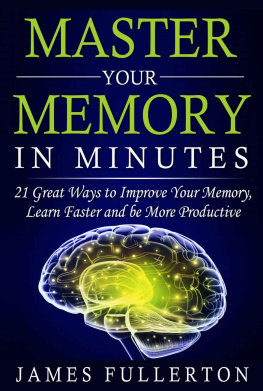MASTER YOUR MEMORY
MASTER YOUR MEMORY
Learn Simple, Effective Techniques to
Remember Anything in any Course or Meeting
Instantly Remember Names and Faces
Never Lose Your Eyeglasses or Keys Again!
From Americas Top Expert on Study Skills
Ron Fry

Copyright 2017 by Ron Fry
All rights reserved under the Pan-American and International Copyright Conventions. This book may not be reproduced, in whole or in part, in any form or by any means electronic or mechanical, including photocopying, recording, or by any information storage and retrieval system now known or hereafter invented, without written permission from the publisher, The Career Press.
MASTER YOUR MEMORY
TYPESET BY KARA KUMPEL
Cover design by Jon Friedman
Printed in the U.S.A.
To order this title, please call toll-free 1-800-CAREER-1 (NJ and Canada: 201-848-0310) to order using VISA or MasterCard, or for further information on books from Career Press.

The Career Press, Inc.
12 Parish Drive
Wayne, NJ 07470
www.careerpress.com
Library of Congress Cataloging-in-Publication Data
CIP Data Available Upon Request.
Contents
Introduction
Its All in Your Mind
A man should keep his little brain attic stocked with all the furniture that hes likely to use, and the rest he can put away in the lumber-room of his library, where he can get it if he wants it.
Sir Arthur Conan Doyle
You misplace your glasses (keys, purse) every day.
You just walked out of a test, frustrated and discouraged, because you knew the material, you really knew ityou just didnt remember it then.
The last time you had to give a sales presentation, you lost your place in your memorized speech and froze, unable to continue.
You ran from one room to another like a frenzied cat then couldnt remember why.
In other words, you are just like virtually every person on the planet who didnt learn the methods, techniques, and systems that will make remembering almost anything for as long as you want (or need) to so much easier.
I can relate to every one of these examples (and many more!). Before anyone had GPS, navigators, or cell phonesin other words, the Dark AgesI met a girl at a concert. She gave me her address just in case I got lost trying to follow her home. I did get lost, and I did forget the address, and I was sorry!
I have bombed tests on subjects I knew backward and forward. I have spent hours looking for keys, glasses, phones, and that little piece of paper I need to remember to bring to work. And when I was a salesperson selling magazine ad space, I confidently answered a question about my publications circulation with a resounding Uhhhhhh.
We all have average memories
Virtually all of us start with the same basic memory abilities, no more, no less. Some of us are a little better in some areas than othersI have a gift for numbers, remember far too much trivia, and have become pretty adept at Introduction remembering cards while playing bridge or poker. But if I didnt actually work at it, I would probably forget my best friends name. I am completely lost in social situations, and I would have great difficulty memorizing a poem, song, or script word-for-word. And I still manage to lose my glasses occasionally.
But when I choose toand we will soon see how important that interest isand apply some of the memory techniques youre going to learn in this book, I can virtually eliminate my weakest areas and strengthen my strongest.
What does an average memory look like? If I tested you on how many digits, names, faces, or random words you could memorize in a minute (and I will in ), many of you would remember 7 to 10 of each. Not usually less, not many more. Again, some of you will be a little better at one kind of task than another. But without some training, without learning ways to improve your memory, even remembering a 10-item grocery list may be a chore.
Astounding feats of memory athletes
Memory athletes participate in local, national, or World Memory Championships, and they can do some astounding feats.
In 2015, the Guinness Book of World Records announced that Rajveer Meena had memorized the value of pi to 70,000 places. (Guinness doesnt recognize Akira Haraguchis claim that he recited pi to 100,000 places in 2006.)
In 2016, Alex Mullen, a second-year medical student at the University of Mississippi, became the first American to win the World Memory Championships. Among other accomplishments, he memorized a single deck of 52 cards in 18.653 seconds, 28 decks (plus four cards) in an hour, 3,029 digits in one hour, and 505 shapes in 15 minutes.
Interestingly, memory training is task specific. Chess masters can glance at a board and almost immediately recognize its patterns. Ask them a few hours later to reproduce it and they will. But if the pieces on the board were set up entirely randomly, they will recall it about as well as you would. In other words, not at all!
Memory athletes who can memorize umpteen decks of playing cards in a few minutes wouldnt remember the random chess board either. They are averagejust like you and mein any memory test for which they have not specifically trained.
Journalist Joshua Foer observed the 2005 USA Memory Championships to write a piece for Slate magazine. Intrigued, he decided to try some of the techniques the memory athletes used to see how they would work for him. He not only entered the competition the next year, he won (and chronicled his year-long efforts and the competition in the bestselling Moonwalking With Einstein).
But although he had mastered a variety of sophisticated memory techniques, he sometimes found their usefulness in the real world less than overwhelming: Even once Id reached the point where I could squirrel away more than 30 digits per minute in memory palaces, I still only sporadically used the techniques to memorize the phone numbers of people I actually wanted to call. Occasionally Id memorize shopping lists, directions, to-do lists, but only in the rare circumstances when there wasnt a pen available to jot them down. Its not that the techniques didnt work. I am walking proof that they do. Its that it is so hard to find occasions to use them in the real world in which paper, computers, cell phones, and post-its can handle the tasks of remembering for me.
Can it really be true that unless we practice memory techniques we are all just, well, average? What about London cabbies, who have to pass what some have called the toughest test in the worldthe Knowledgewhich requires them to memorize 320 basic routes, 25,000 streets, and 30,000 point of interest (from hotels, restaurants, and schools to police stations, landmarks, and tourist attractions)? Do they have some innate ability attributable to warm beer or a plethora of fish and chips?
No. They invariably use the techniques we are going to discuss in far more detail in the following chapters. As Ed Cooke, a British grand memory master, told Foer: My memory is quite average. All of us (memory athletes) have average memories.
So how hard do we have to work at this?
It does not take an extraordinary mind to develop an extraordinary memory.
I am pretty sure most of you do not plan on driving a London cab or want to see how fast you can memorize a deck of cards. Most of you face similar if less overwhelming memory tasks: If you are a high school, college, or graduate student, you need to be able to recall important dates in history, authors and their books, chemical formulas and equations, scientific laws, important legal cases, or even every nerve, muscle, and bone in the human body. Teachers need to recall detailed lesson plans; coaches need to remember detailed practice plans.
Next page

